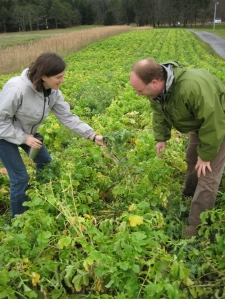
Study lead Meagan Schipanski and co-author Jason Kaye.
In the environment, everything affects everything else, prompting someone to once say, “ecology isn’t rocket science, it’s much harder.” This complexity is especially true in agricultural systems. Farmers make many management decisions: go organic or not, use full or reduced plowing, decide what mixture of crops to rotate. These decisions then affect soil quality and weed and insect abundance, which in turn affect crop production. This complexity makes it difficult to determine which management strategies really work, and why. To help resolve this challenge, the Lewis Lab collaborated in a recent study that compared soil, weed, insect, and crop responses to different cropping system strategies. The study was conducted at Penn State, led by Meagan Schipanski at Colorado State University. It was set in Pennsylvania at experimental farmland undergoing a three-year transition from conventional to organic production. Farm plots were plowed using either full or reduced tillage, and either included perennial sod-forming or annual cover crops prior to cultivating soy and corn. We used statistical approaches that are relatively new to agroecology in order to determine how these management strategies impacted interactions among soils, weeds, and insects, and how those factors in turn influenced crop yields. We found that managing weed populations through full tillage in organic farm systems can improve crop yields. However, these short-term profits come at the expense of a loss in soil quality and beneficial insect conservation when soils are heavily plowed. Check out the paper here!

